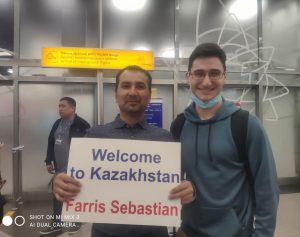 I’m willing to take a bet that very few Tarheels have ever been to Kazakhstan; home of our Russian Flagship Program’s Capstone program. This was certainly the case for me as I set off for the RLASP Summer Immersion program in Almaty. Stepping off the plane and into the Almaty airport, I had virtually no idea what to expect. Of course, I did some background research on Kazakhstan and briefly spoke to my host parents on video call before departure, but since this was only my second time traveling abroad I still felt like a complete rookie. Luckily, upon landing at 1am I was greeted with open arms and smiles by my host family. Riding in the car in the middle of the night after 19 hours of flight and suddenly thrown into Russian conversation was a complete shock to my system – but also a comfort. I was surprised at how well I was able to understand my host parents and express myself back to them!
I’m willing to take a bet that very few Tarheels have ever been to Kazakhstan; home of our Russian Flagship Program’s Capstone program. This was certainly the case for me as I set off for the RLASP Summer Immersion program in Almaty. Stepping off the plane and into the Almaty airport, I had virtually no idea what to expect. Of course, I did some background research on Kazakhstan and briefly spoke to my host parents on video call before departure, but since this was only my second time traveling abroad I still felt like a complete rookie. Luckily, upon landing at 1am I was greeted with open arms and smiles by my host family. Riding in the car in the middle of the night after 19 hours of flight and suddenly thrown into Russian conversation was a complete shock to my system – but also a comfort. I was surprised at how well I was able to understand my host parents and express myself back to them!
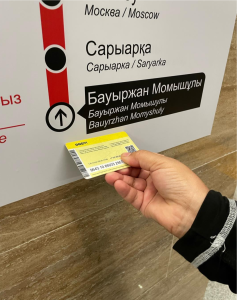 Now that I have been here for a few weeks, I have an established routine. I usually wake up around 7:30, eat my breakfast, and rush to the metro. Classes start at 9 and I like to get there a bit early, so I find it best to keep a morning routine short and simple – you never know when public transportation will be delayed, so it’s always best to err on the side of caution and leave early. Language classes run from 9am-1pm every day, with culture and history classes twice a week from 2-4pm. I typically eat lunch at a nearby restaurant, and then hit the gym (we have a super convenient one right across the street from the classroom building!).
Now that I have been here for a few weeks, I have an established routine. I usually wake up around 7:30, eat my breakfast, and rush to the metro. Classes start at 9 and I like to get there a bit early, so I find it best to keep a morning routine short and simple – you never know when public transportation will be delayed, so it’s always best to err on the side of caution and leave early. Language classes run from 9am-1pm every day, with culture and history classes twice a week from 2-4pm. I typically eat lunch at a nearby restaurant, and then hit the gym (we have a super convenient one right across the street from the classroom building!).
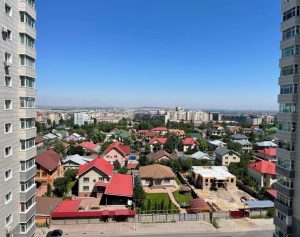 I always dedicate the latter half of my day to a self-guided excursion. Exploring the city gives me practice conversing with locals, improves cultural awareness, and, of course, I get to see all kinds of landmarks, attractions, historical artifacts, and so forth. Almaty is filled with hidden gems; from Tsarist graveyards, to glorious cathedrals and mosques, to the largest museum in the country, there is no shortage of afternoon activities. City exploration is discovering a different culture paired with language practice. You aren’t simply being a tourist; you’re hearing conversation in the target language, reading street signs, finding directions, etc. As foreigners, we are granted an amazing gift called “instant conversation starter.” Just by saying you’re not from Kazakhstan, I find most locals immediately light up with interest – you skip right past the awkward “what do we talk about” stage and get plunged right into the good stuff! Needless to say, this is all great practice for developing Russian speaking and comprehension.
I always dedicate the latter half of my day to a self-guided excursion. Exploring the city gives me practice conversing with locals, improves cultural awareness, and, of course, I get to see all kinds of landmarks, attractions, historical artifacts, and so forth. Almaty is filled with hidden gems; from Tsarist graveyards, to glorious cathedrals and mosques, to the largest museum in the country, there is no shortage of afternoon activities. City exploration is discovering a different culture paired with language practice. You aren’t simply being a tourist; you’re hearing conversation in the target language, reading street signs, finding directions, etc. As foreigners, we are granted an amazing gift called “instant conversation starter.” Just by saying you’re not from Kazakhstan, I find most locals immediately light up with interest – you skip right past the awkward “what do we talk about” stage and get plunged right into the good stuff! Needless to say, this is all great practice for developing Russian speaking and comprehension.
When I finally return home, I try to spend as much time as possible with my host family to continue practicing my speaking skills and listening comprehension. Quite often my family will have an evening activity planned or we all eat together and converse! Weekends are usually set aside for group excursions (hikes, hikes, hikes) and host family time.
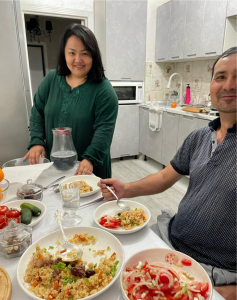 So now, Tarheels, what kind of culture shock should you expect in Almaty? The food! Talk about a positive culture shock! Central Asian food is absolutely delicious, and there are so many dishes to try. Host families absolutely love to feed you, since the Kazakh culture of hospitality and respect revolves mostly around food and tea. Don’t be afraid to try new things! Was I a tiny bit nervous when offered the brain of a ram? Absolutely! But now I can say I’ve tried it, something very few other Carolinians can probably attest to! Growth can’t occur without experimentation, so don’t fear the food. You’ll likely end up loving most if not all traditional Kazakh dishes, and if not, at least you’ll know! Essentially every main dish revolves around meat, so if you’re vegetarian be sure to make that explicitly (and respectfully) clear to your host family upon arrival. But there’s no need to fear missing out because of dietary restrictions, plenty of side courses, soups, and deserts are fruit/veggie/and milk based! Basically, the food is great – embrace it as much as you are able.
So now, Tarheels, what kind of culture shock should you expect in Almaty? The food! Talk about a positive culture shock! Central Asian food is absolutely delicious, and there are so many dishes to try. Host families absolutely love to feed you, since the Kazakh culture of hospitality and respect revolves mostly around food and tea. Don’t be afraid to try new things! Was I a tiny bit nervous when offered the brain of a ram? Absolutely! But now I can say I’ve tried it, something very few other Carolinians can probably attest to! Growth can’t occur without experimentation, so don’t fear the food. You’ll likely end up loving most if not all traditional Kazakh dishes, and if not, at least you’ll know! Essentially every main dish revolves around meat, so if you’re vegetarian be sure to make that explicitly (and respectfully) clear to your host family upon arrival. But there’s no need to fear missing out because of dietary restrictions, plenty of side courses, soups, and deserts are fruit/veggie/and milk based! Basically, the food is great – embrace it as much as you are able.
What are some other culture shock moments to prepare for? Public transportation! Our home base of Almaty is a huge city, and many of us Carolinians are simple small-town folk. You will have to use the bus system frequently, and there’s about a 95% chance you’ll have to use the metro. If you’ve never lived in a metropolis before, these public transit systems can seem awfully daunting and confusing. The good news is that the learning curve is quick. Once you’ve taken the metro twice you’re already a pro – once you know how to swipe your card and know the name of your station there really isn’t any issue. Every other student in our group confirmed that their host family walked them through the ropes of public transport, so you won’t face this challenge on your own. The families are here to help you in more ways than just language!
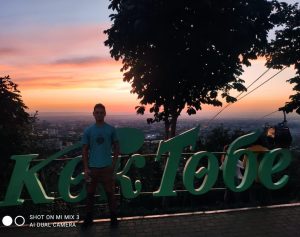 What advice can I share? First, maintaining a good sleep schedule is crucial, far more so than in America where you have a familiar established routine. Second, the more hours making meaningful and lasting connections with your host family and other locals, the better. And above all else, respect your host family the same way they respect you. Making a permanent connection with your host family not only gives you “friends,” but a literal family abroad who you very well may have the opportunity to live with again in the future now that you’ve established a bond. Don’t be afraid to try new things and take advantage of every moment you can. The experience will give you what you put into it, so if you really throw yourself into the fray, you’ll come out a stronger and more enlightened individual.
What advice can I share? First, maintaining a good sleep schedule is crucial, far more so than in America where you have a familiar established routine. Second, the more hours making meaningful and lasting connections with your host family and other locals, the better. And above all else, respect your host family the same way they respect you. Making a permanent connection with your host family not only gives you “friends,” but a literal family abroad who you very well may have the opportunity to live with again in the future now that you’ve established a bond. Don’t be afraid to try new things and take advantage of every moment you can. The experience will give you what you put into it, so if you really throw yourself into the fray, you’ll come out a stronger and more enlightened individual.
Sebastian is in his second year at UNC Chapel Hill and is a double major in Russian Language & Culture and Peace, War & Defense. Sebastian began studying Russian as a sophomore in high school in Winchester, Virginia and was awarded a Fulbright-Hays fellowship by American Councils to participate in the Advanced Russian Language and Area Studies Program in Almaty, Kazakhstan in the summer of 2022.
